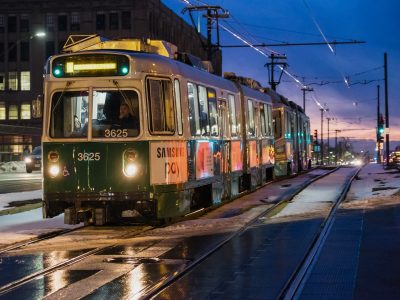In the last sprint before the release of a new transit financing bill, Massachusetts groups are rallying to increase investment in mass transportation and combat transit inequity by supporting a swath of policy changes, such as raising gas taxes and Uber fees.

Members from more than 20 transportation advocacy groups packed a hearing room Tuesday to deliver a “call to action” to lawmakers, pushing for policies and investments to fix what they called a “transportation crisis” highlighted by Massachusetts Bay Transportation Authority train derailments, deteriorating infrastructure and poorly-funded regional transit.
Stacy Thompson, executive director of LivableStreets Alliance, said in a speech she thinks the funding package should go toward fixing Massachusetts’ public transit and infrastructure.
“I don’t need to tell you that we are in a transportation crisis,” Thompson said. “You experience it every single day.”
Thompson and other advocates called for a comprehensive funding package that would raise revenue for roads and bridges, the MBTA and Regional Transportation Authorities.
Other proposals include enacting congestion pricing on highways to reduce traffic jams and moving toward an electricity-powered transit system to combat air pollution.
State Rep. Sarah Peake of Provincetown was among the supporters of the activists’ proposals in the legislature, calling it a “generational game-changer” whose impact equates to that of the $1.5 billion public education funding law that passed last year.
“Just as the Student Opportunity Act was a once-in-a-lifetime, generational improvement for our public education,” Peake said in her speech, “I’m incredibly optimistic that this transportation bill is similarly going to be a generational game-changer in the way we fund and, almost more importantly, the way we provide public transit to the citizens of Massachusetts.”
Activists also drew attention to socioeconomic gaps between residents that sometimes prohibit them from accessing public transportation — such as high fares, lack of accessible MBTA facilities or narrow-ranging service times in certain neighborhoods.
MBTA needs to purchase at least 200 additional buses to meet the transit demands of Metro Boston, according to a LivableStreets report last September. The report also found that black riders spend 64 hours more per year on MBTA buses relative to white passengers, while Latinx riders spent 10 more hours than white passengers.
“This may seem overwhelming, especially in the context of derailed trains and a catastrophic safety report,” Thompson said. “But the fact is, there are simple straightforward solutions that we could be enacting today: buy more buses, hire more operators and run more service.”
Chris Dempsey, director of Transportation for Massachusetts, said in his speech residents of Massachusetts deserve a better transportation policy than the status quo, which he said is plagued by heavy congestion, expensive fares and high carbon emissions.
The state’s gas tax has increased 14 percent since 1991, according to Dempsey, while MBTA fares have grown 300 percent in the same period.
“We deserve fares that allow access to the system, that have low-income fares and maybe even free fares on buses around the state,” Dempsey said at the event. “We deserve better policies that make more sense than the ones we have today.”
Dempsey also said the state’s level of congestion is the “worst in the nation,” and pointed to ride-hail services’ contributions to clogging the roads.
According to a July 2019 report by the Metropolitan Area Planning Council, the rapid growth of Uber and Lyft across Massachusetts cost the MBTA $23 million in 2018 in fare revenue as travelers opted for ride-hailing instead of public transit.
Ride railing also had a net carbon footprint of nearly 100,000 metric tons in 2018, adding about 0.5 percent to total carbon emissions for all passenger transportation across the state, according to the report.
The long-watched transportation financing bill will likely be released late this month or early March, Mass. House Speaker Robert DeLeo said to reporters at the State House.
Activists visited their state representatives’ and senators’ offices following the speeches to voice their support for the investment proposals. Thompson said it was their last chance to rally momentum before the bill is finalized.
“Our group is saying these are the things we recommend, and these are the ways we recommend you spend your money,” Thompson said. “We are trying to tell the legislature what we want, need and hope that they will act on.”
Several Boston residents who use MBTA buses on a regular basis shared their opinions on the proposed measure to raise gas taxes and Uber fares.
Michelle Chan, 48, of Downtown Boston said she considers it a fair tradeoff, citing the environmental benefits of sharing rides.
“I think public transportation is an important way to reduce our greenhouse gas emissions and environmental impact,” Chan said. “If you have the choice to use ride-shares or your own vehicles, I think it makes sense to help subsidize things that are for the majority of transit users.”
Oakley Singer, 26, of Brighton said more buses would reduce wait time, and that he also supports more funding for public transit.
“Of course, it would be better to have cheaper transportation,” Singer said. “[It’s] better for the masses.”
Meanwhile, other residents said they think the increase in gas taxes and Uber fees would do more harm than good.
Morren Gray, 59, of Back Bay said she believes increasing taxes poses the danger of incentivizing further tax hikes in the future, and that cheaper public transit does not guarantee an improvement in service.
“Once is okay, but next time it’s a crazy mess,” Gray said. “It can get cheaper, but it’s not good service. Sometimes the service is terrible, and sometimes it’s okay.”
Neha Panchal, 27, of Downtown Boston said although she would like subway and rail cars to reach more neighborhoods, she does not want higher Uber fares because people in the city still need ride-hail services.
“If I want to go to Burlington or some remote areas, traveling is difficult via [public] transportation itself,” Panchal said. “So it becomes a bit problematic.”



















































































































